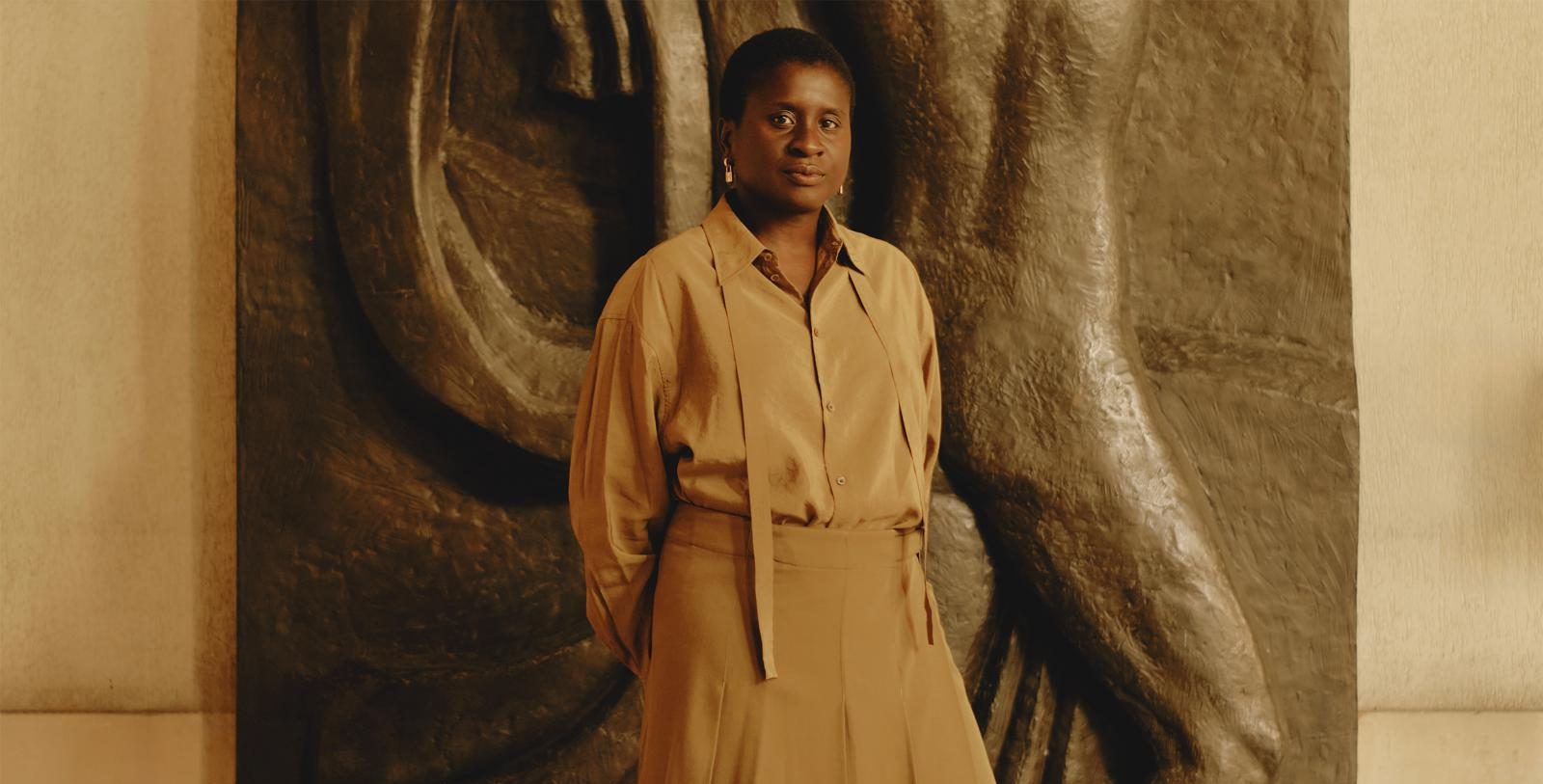BFI’s Ama Ampadu On Her Eclectic Career & The “Exceptional” Year Of British Filmmaking: “We’ve Got To Find A Way To Keep This Momentum Going”

2025 has been an impressive year for the British Film Institute (BFI) in its often scrutinized role as a supporter of original filmmaking, with breakout titles emerging across the festival circuit. Popular titles include the BFI’s trio of Cannes debuts: Harris Dickinson’s *Urchin*, *My Father’s Shadow* by Akinola Davies Jr., and Harry Lighton’s *Pillion*. Over in Venice, *Rose of Nevada* by Mark Jenkin, Imran Perretta’s *Ish*, and Annemarie Jacir’s *Palestine 36* debuted at TIFF.
The success can be felt across the sector with *My Father’s Shadow*, *Ish*, and *Urchin* originally developed at BBC Film, and *Rose of Nevada* at Film4, with the BFI supporting through production finance.
> “The filmmakers we’ve supported have done extraordinarily well,” Ama Ampadu, BFI Film Fund Senior Production & Development Executive, told us ahead of this year’s London Film Festival, where many of these titles are receiving their homecoming screenings. “We do our part, but it is ultimately the filmmakers who have done this extraordinary amount of work, and they’ve been exceptionally well received.”
### Leadership and Team at BFI
Ampadu, who served as the Executive Producer on five of the BFI’s titles this year — including *Urchin*, *My Father’s Shadow*, and *Rose of Nevada* — joined the BFI’s Filmmaking Fund team in 2023 after over a decade as an independent producer. Industry veteran Mia Bays has led the Fund since 2021.
The Executive team also includes:
– Senior Production & Development Executive Louise Ortega, Executive Producer on *Pillion*, *Hamlet*, and *Retreat*
– Vicki Brown (Senior Executive, Sales & Distribution)
– Anna Hintzen (Senior Production Executive)
– Morgana Melvin (Senior Inclusion & Industry Manager)
### Ama Ampadu’s Esteemed Career
Before joining the BFI, Ampadu produced notable films such as Yared Zeleke’s *Lamb*, the first Ethiopian film to screen at Cannes in 2015, and Mati Diop’s Golden Bear-winning *Dahomey*. She also worked on gallery space films like *The Fist* and *Faluyi* by Ayo Akingbade.
> “Ama took part in one of the shoots in Benin, but our collaboration became particularly significant during the film’s release in the UK. Ama did remarkable work in this regard, demonstrating a subtle and sensitive understanding of the political and symbolic dimensions of such an approach,” Diop shared about Ampadu’s role in shaping the UK release of *Dahomey*.
The Golden Bear-winning film became a significant event across the UK, with Diop, Ampadu, and collaborators hosting intimate saloon-style screenings for students, artists, and academics, fostering deep discussions on the film’s philosophical richness.
> “Her deep connection to London’s Black artistic community played a major role in making the London premiere of *Dahomey* a profoundly meaningful moment of communion. She is a producer whose voice and vision have an important place in the contemporary cinematic landscape,” Diop affirmed.
Ampadu’s experience working across Europe and the African continent — from gallery spaces to traditional cinemas — makes her uniquely positioned among UK public funders.
> “I first met Ama a few years ago through some filmmaker friends of mine in Kenya, and she’s been extremely supportive and encouraging,” said Davies Jr. of collaborating with Ampadu on his Nigeria-shot debut *My Father’s Shadow*, which has been submitted as the UK’s Oscar entry.
> “Working in Nigeria is probably unique from working anywhere else on the continent. She had some previous experience, and her ability to connect artists from across the Black diaspora is unmatched. She’s extremely well-connected — more than anyone I’ve met before — and her knowledge and connections across the art world were really crucial.”
—
## Ama Ampadu in Conversation: A Journey Through Film
**DEADLINE:** Ama, what’s your background? How did you get started in the business?
**AMA AMPADU:** I grew up in Edmonton, North London. I studied Contemporary History with French at university, focusing on how European countries constructed memory post-WWII. Film played a key role, especially in France — works like *Hiroshima, Mon Amour*, *The Battle of Algiers*, and Claude Lanzmann’s *Shoah* profoundly impacted me. These films showed how cinema can radically shape a nation’s self-image.
After university, I worked at the UN in educational research for five years. Then, like many aspiring filmmakers, I moved to New York to gain experience on significant film sets. I was fortunate to work with Darren Aronofsky on *Black Swan*. That time taught me a lot about community and what it takes to put together a film project.
**DEADLINE:** Which film was Darren working on?
**AMPADU:** *Black Swan*.
**DEADLINE:** That must have been an incredible experience. What was New York like back then?
**AMPADU:** It was a hub of aspiring artists. I started producing short films myself. On *Black Swan*’s set, I met Ethiopian filmmaker Yared Zeleke. Through him, I connected with the NYU film community and eventually helped set up a production company in Ethiopia to turn his thesis film into a feature.
*Lamb* became a co-production between Ethiopia, France, Norway, Germany, and Kenya, and I was the lead producer. The film’s selection at Cannes was a huge milestone.
**DEADLINE:** *Lamb* was the first Ethiopian film to be selected at Cannes, right?
**AMPADU:** Yes, it was. That experience laid a solid foundation for my career, connecting to my work at the BFI. As an indie producer, you quickly learn that even with festival acclaim, making a second film is challenging. Building a sustainable business around multiple projects is essential. That’s why de-risking development is a priority for us at the BFI, particularly through our Development Fund.
**DEADLINE:** How did you end up at the BFI?
**AMPADU:** When the role opened, I applied because its core priorities aligned with my experience. Producing involves a lot of anxiety, so empathy is key in supporting producers. Small and medium-sized production companies are important to me because we need to help them build sustainable businesses.
**DEADLINE:** What needs to happen to support these producers better?
**AMPADU:** Public funders need to focus on providing resources that help producers attract writers and directors, including paying them properly. When moving towards production funding, resources for location scouting, budgeting, and casting are vital to build solid packages. Talent progression matters too—supporting producers transitioning from shorts to feature films.
For example, *Urchin* is Archie Pearch’s first film, which is a difficult leap regardless of Harris Dickinson’s involvement. When projects reach the BFI, we actively connect producers to equity financiers at markets like Cannes, helping them build networks to finance current and future projects.
—
## Collaborating with Mati Diop and Exploring African Cinema
**DEADLINE:** You worked closely with Mati Diop on *Dahomey*, which won the Golden Bear. How did you two start collaborating?
**AMPADU:** We met around 2012 at Cannes and later at Locarno’s Open Doors. Back then, *Atlantics* was still *The Fire Next Time*, and everyone was hustling. We had a natural connection and have been in touch ever since.
*Dahomey* was shot partly in Benin, following 26 art objects sent there. Mati filmed in multiple stages, and I joined for additional reshoots. When we screened the film, it was clear that it was a unique art piece—a historical document bridging Africa’s past, present, and future with spiritual themes.
The synergy with the music by Wally Badarou and Dean Blunt added to its depth.
—
## Spotlight on *My Father’s Shadow* and the UK-Nigeria Connection
**DEADLINE:** Tell me about *My Father’s Shadow*, set in Nigeria. Akinola Davies Jr. is one of the year’s breakout talents. The film didn’t have a known Hollywood name attached, unlike some others.
**AMPADU:** The UK is incredibly diverse, and Nigeria was part of the former British Empire, so it felt natural to support this story. Being British is a broad identity. Films like Sandhya Suri’s *Santosh* and Karan Kandhari’s *Sister Midnight* explore Indian life; today’s popular culture is hybrid.
Young people are influenced by artists like Davido, Rema, and Wizkid as much as by any other culture. This multicultural influence isn’t new—it reflects historical connections seen in filmmakers such as Nii Kwate Owoo from Ghana or John Akomfrah, who has been vital for me.
—
## The Current Marketplace: Progress and Challenges
**DEADLINE:** What’s your take on the current UK film marketplace? What’s working, and what needs changing?
**AMPADU:** Collectively, public funders are investing in a new wave of British film talent. It began with Charlotte Wells and has since included Georgia Oakley, Charlotte Regan, Raine Allen Miller, and Molly Manning Walker.
Exciting debut films from Laura Carreira and Sandhya Suri, and breakout talents like Harris Dickinson, Akinola Davies Jr., Harry Lighton, and Imran Perretta illustrate a promising future.
Mark Jenkin’s *Rose of Nevada* is expanding his fan base with its larger scale production, featuring George MacKay and Callum Turner.
This success reflects strong development efforts from the BFI, BBC Film, and Film4, alongside new initiatives like the Independent Film Tax Credit, which provides cornerstone financing and helps get more projects made.
However, inflation and rising costs remain challenges across industries. It’s early to be definitive, but signs are positive. Our research team will release a report next year tracking these impacts.
Another boost is the UK Global Screen Fund (UKGSF) increasing its annual funding from £7m to £18m for four years. UKGSF supports UK producers to expand through minority co-productions, helping to build international networks, encourage cultural exchange, and adopt new working methods.
We acknowledge that supporting producers sustainably is an ongoing challenge. At BFI, we launched the Creative Challenge Fund targeting producers, and continue assessing how to best support development with available resources.
—
**DEADLINE:** So, will 2026 look the same as this year for you?
[Interview ends]
—
The British Film Institute’s continued commitment to nurturing diverse voices and original filmmaking, supported by dedicated executives like Ama Ampadu, signals an exciting future for UK cinema. With a focus on sustainable producer careers, international collaborations, and fostering new talent, the BFI remains a vital pillar in the industry’s evolving landscape.
—
*Published by [Your Publication Name]*
https://deadline.com/2025/10/ama-ampadu-bfi-lff-2025-1236583471/







